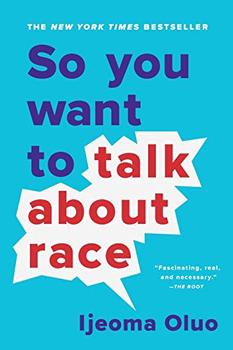Summary | Excerpt | Reading Guide | Reviews | Beyond the Book | Readalikes | Genres & Themes | Author Bio

Excerpt
So You Want to Talk About Race
As a black Woman, race has always been a prominent part of my life. I have never been able to escape the fact that I am a black woman in a white supremacist country. My blackness is woven into how I dress each morning, what bars I feel comfortable going to, what music I enjoy, what neighborhoods I hang out in. The realities of race have not always been welcome in my life, but they have always been there. When I was a young child it was the constant questions of why I was so dark while my mom was so white—was I adopted? Where did I come from? When I became older it was the clothes not cut for my shape and the snide comments about my hair and lips and the teen idols that would never ever find a girl like me beautiful. Then it was the clerks who would follow me around stores and the jobs that were hiring until I walked in the door and then they were not. And it was the bosses who told me that I was too "loud," the complaints that my hair was too "ethnic" for the office, and why, even though I was a valued employee, I was making so much less money than other white employees doing the same job. It is the cops I can't make eye contact with, the Ubers that abandon their pickup, driving on instead of stopping when they see me. When I had my sons, it was the assumptions that they were older than they were, and that their roughhousing was too violent. It was the tears they came home with when a classmate had repeated an ignorant comment of their parent's. But race has also been countless hours spent marveling at our history. Evenings spent dancing and cheering to jazz and rap and R&B. Cookouts with ribs and potato salad and sweet potato pie. It has been hands of women braiding my hair. It has been reading the magic of the words of Toni Morrison, Maya Angelou, and Alice Walker and knowing that they are written for you. It has been parties filled with Jollof rice and fufu and Nigerian women wearing sequin-covered gowns and giant geles on their heads. It has been the nod to the black stranger walking by that says, "I see you fam." It has been pride in Malcolm, Martin, Rosa, and Angela. It has been a room full of the most uninhibited laughter you've ever heard.
It has been the touch of my young son as he lays his hand over mine and says "We're the same brown."
Race, my race, has been one of the most defining forces in my life. But it is not something I always talked about, certainly not the way that I do now.
Like many people, most of my days were spent just trying to get by. Life is busy and hard. There are work and kids and chores and friends. We spend a lot of time bouncing from one mini-crisis to the next. Yes, my days were just as full of micro-aggressions, of the pain and oppression of racism, as they are now—but I just had to keep going on like normal. It is very hard to survive as a woman of color in this world, and I re- member saying once that if I stopped to feel, really feel, the pain of the racism I encountered, I would start screaming and I would never ever stop.
So I did what most of us do, I tried to make the best of it. I worked 50 percent harder than my white coworkers, I stayed late every day. I dressed like every day was a job interview. I was overpolite to white people I encountered in public. I bent over backwards to prove that I was not angry, that I was not a threat. I laughed off racist jokes as if I didn't feel the sting. I told myself that it would all be worth it one day, that being a successful black woman was revolution enough.
But as I got older, as the successes I had reached for slowly became a reality, something inside me began to shift. I would try to make my voice quieter in meetings and I couldn't. I would try to laugh off the racist jokes and I couldn't. I would try to accept my boss's reasons for why I could have my pro- motion but not my raise, and I couldn't. And I started talking. I started to question, I started to resist, I started to demand.
Excerpted from So You Want to Talk About Race by Ijeoma Oluo. Copyright © 2019 by Ijeoma Oluo. Excerpted by permission of Seal Press. All rights reserved. No part of this excerpt may be reproduced or reprinted without permission in writing from the publisher.
Your guide toexceptional books
BookBrowse seeks out and recommends the best in contemporary fiction and nonfiction—books that not only engage and entertain but also deepen our understanding of ourselves and the world around us.